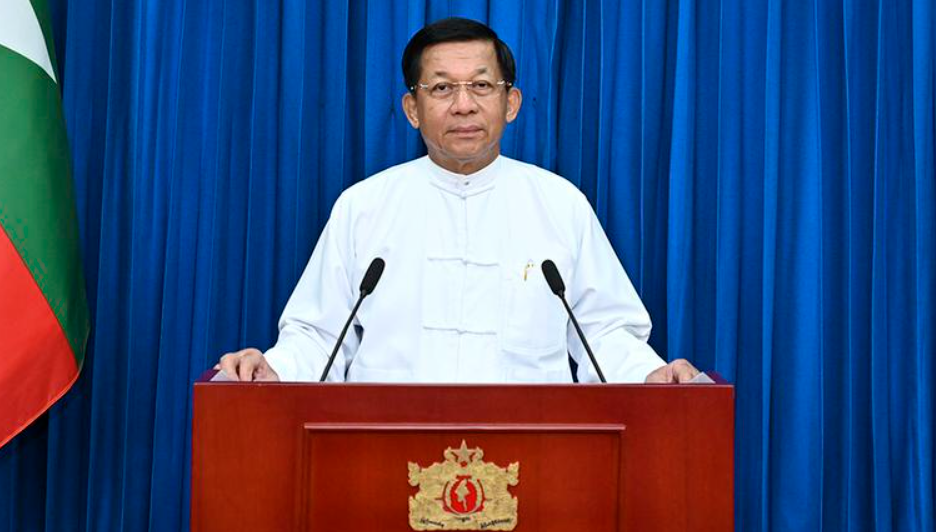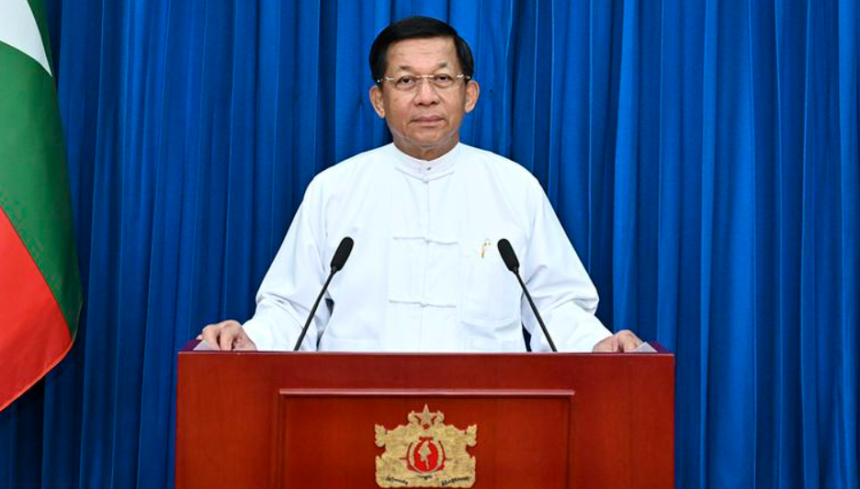In a significant development that underscores the complex political dynamics of Southeast Asia, Myanmar’s junta chief, Senior General Min Aung Hlaing, is scheduled to visit China next month. This visit marks a continuation of Myanmar’s engagement with its powerful northern neighbor amidst ongoing internal strife and international isolation following the military’s seizure of power in February 2021. The upcoming visit will likely cover a range of strategic, economic, and security issues, deepening the bilateral ties between the two nations while raising concerns within the international community about the growing influence of China in Myanmar.
In this article, we delve into the potential significance of Min Aung Hlaing’s visit to China, explore the historical context of Myanmar-China relations, analyze the implications for regional politics, and assess how this meeting could impact Myanmar’s political landscape and its standing on the global stage.
1. Historical Context of Myanmar-China Relations
1.1 The Historical Ties Between Myanmar and China
Myanmar and China share a long and multifaceted relationship that dates back centuries. Geopolitical realities, shared borders, and historical trade routes have shaped the ties between the two countries. Although relations have experienced ups and downs, China has remained a crucial partner for Myanmar, especially during periods of Western sanctions and diplomatic isolation. Myanmar has relied on China for economic assistance, political support, and military aid, while China views Myanmar as an important strategic partner in its Belt and Road Initiative (BRI) and its broader ambitions in Southeast Asia.
1.2 China’s Role in Supporting the Myanmar Junta
Since the military coup in Myanmar in 2021, China has maintained a cautious yet supportive stance toward the junta. While avoiding overt support for the coup, China has refused to join Western-led sanctions and has continued to engage with Myanmar’s military leadership. Beijing’s interest in Myanmar is driven by its economic and strategic objectives, including the development of infrastructure projects such as the China-Myanmar Economic Corridor (CMEC), which is part of the BRI.
China’s non-interference policy has allowed it to maintain influence in Myanmar without explicitly backing the junta, positioning itself as a pragmatic partner that can work with whichever regime is in power. The upcoming visit by Min Aung Hlaing could signal further deepening of this relationship, especially as Myanmar seeks to mitigate the effects of international isolation. 
2. Significance of Min Aung Hlaing’s Visit to China
2.1 Diplomatic Significance
The visit of Min Aung Hlaing to China holds significant diplomatic value for both countries. For Myanmar, it is an opportunity to secure much-needed political support and economic assistance from its largest neighbor. For China, it presents an opportunity to reaffirm its influence in Myanmar and ensure that the junta remains aligned with Beijing’s strategic interests.
- Myanmar’s Diplomatic Isolation: Since the coup, Myanmar has faced widespread condemnation from the international community. Western countries, including the United States and the European Union, have imposed sanctions on Myanmar’s military leaders and entities associated with the regime. In this context, China’s continued engagement with Myanmar serves as a diplomatic lifeline for the junta.
- China’s Strategic Interests: China’s interest in Myanmar is driven by its desire to secure access to the Indian Ocean, develop infrastructure projects, and prevent instability along its southern border. By maintaining close relations with the junta, China ensures that its strategic projects, such as the Kyaukphyu deep-sea port and the oil and gas pipelines running from Myanmar to China, are protected.
2.2 Economic and Trade Cooperation
Myanmar’s economy has suffered immensely since the coup, with economic sanctions, internal conflict, and the COVID-19 pandemic taking a heavy toll. Min Aung Hlaing’s visit to China is expected to focus on economic cooperation, with Myanmar seeking investments, trade agreements, and financial assistance from China to stabilize its economy.
- Infrastructure Development: One of the key areas of discussion during the visit is likely to be infrastructure development. China has been heavily involved in building roads, ports, and railways in Myanmar as part of the CMEC. The junta’s willingness to continue these projects, despite internal unrest, suggests that China’s role in Myanmar’s economic future will remain central.
- Trade Relations: China is Myanmar’s largest trading partner, and trade between the two countries has continued despite the political turmoil. The visit may result in new trade agreements or the strengthening of existing ones, particularly in sectors such as energy, agriculture, and mining.
2.3 Security and Military Cooperation
Myanmar’s military junta is facing armed resistance from ethnic armed groups and pro-democracy forces, making security a top priority for the regime. China has historically maintained relations with Myanmar’s military and ethnic armed groups, positioning itself as a key player in the country’s internal security dynamics.
- Military Support: While China has been careful not to overtly support the junta’s military actions, it is likely to offer some form of military assistance or intelligence-sharing during the visit. China’s support could help the junta consolidate power and suppress resistance movements.
- Border Security: The border between China and Myanmar is porous and prone to instability, with ethnic armed groups operating in the area. China is keen to ensure that instability in Myanmar does not spill over into its territory, and border security is expected to be a key topic of discussion during Min Aung Hlaing’s visit.
3. Regional and International Implications
3.1 Impact on ASEAN and Regional Politics
Myanmar’s political crisis has posed significant challenges for the Association of Southeast Asian Nations (ASEAN), of which Myanmar is a member. ASEAN has struggled to mediate the conflict, and the junta’s refusal to engage with ASEAN’s peace initiatives has strained relations within the bloc. Min Aung Hlaing’s visit to China could further complicate ASEAN’s efforts to address the crisis.
- ASEAN’s Mediation Efforts: ASEAN has called for dialogue and a peaceful resolution to Myanmar’s political crisis, but the junta has been resistant to external mediation. China’s close ties with the junta may embolden Min Aung Hlaing to continue resisting ASEAN’s efforts, leading to further divisions within the bloc.
- China’s Role in Regional Stability: China’s involvement in Myanmar has broader implications for regional stability. While China presents itself as a stabilizing force, its support for the junta could exacerbate tensions in Southeast Asia, particularly with countries that are critical of the military regime.
3.2 Implications for U.S.-China Rivalry
The visit comes at a time when the U.S.-Min Aung Hlaing China rivalry is intensifying in the Indo-Pacific region. The United States has been vocal in its condemnation of Myanmar’s junta and has imposed sanctions on military leaders, while China has taken a more pragmatic approach. Min Aung Hlaing’s visit to China could be seen as part of a broader strategy by Beijing to counter U.S. influence in the region.
- Geopolitical Rivalry: The U.S. views Min Aung Hlaing Myanmar’s political crisis as part of its broader strategy to promote democracy and human rights in the Indo-Pacific. China, on the other hand, is focused on securing its strategic interests and maintaining stability. The visit could signal China’s intention to deepen its influence in Myanmar, further complicating the U.S.-China rivalry in the region.
- Human Rights Concerns: The international community, particularly Western countries, has raised concerns about human rights abuses committed by the Myanmar military. China’s continued engagement with the junta, despite these concerns, could lead to increased criticism from the West and further strain China’s relations with Western powers.
4. Conclusion: The Road Ahead for Myanmar-China Relations
Min Aung Hlaing’s upcoming visit to Min Aung Hlaing China is a significant development in the ongoing political crisis in Myanmar. As the junta seeks to consolidate power and navigate its international isolation, China’s support will be crucial in shaping the future of Myanmar’s political landscape. The visit will likely result in deeper economic, military, and diplomatic ties between the two countries, while also raising concerns about the implications for regional stability and the U.S.-China rivalry.
For Myanmar, Min Aung Hlaing the visit represents an opportunity to secure much-needed economic and political support from its powerful neighbor. For China, it is a chance to reinforce its influence in Myanmar and safeguard its strategic interests. However, the international community will be watching closely, particularly as concerns about human rights abuses and the junta’s refusal to engage in meaningful dialogue with opposition groups continue to mount.
As Myanmar navigates its path forward, its relationship with China will play a critical role in determining the country’s future trajectory. Whether this visit will lead to a more stable and prosperous Myanmar, or further entrench the military regime’s grip on power, remains to be seen. ALSO READ:-Approach is to Treat Every Game with Utmost Respect: The Philosophy Behind Success in Sports 2024





